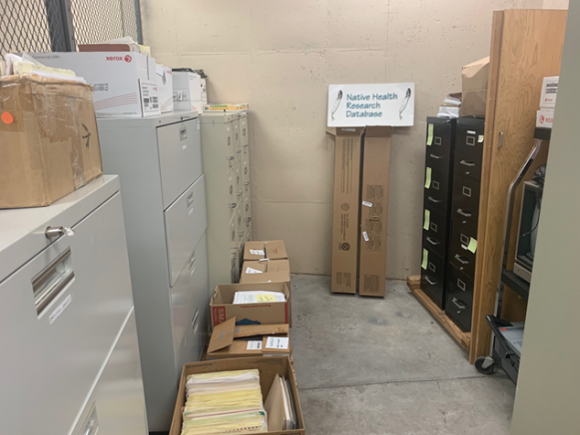History of the NHDThe Native Health Database (NHD) was conceived in the early-1990s, when Dr. William W. Schottstaedt donated over 3,000 documents (dated from 1672-1966) as a collection of “Papers on Indian Health” to UNM's Health Sciences Library and Informatics Center (HSLIC). Under the leadership of Director Erika Love, a multi-year project (1993-1997) was undertaken by HSLIC's Janet Johnson and Henrietta Stockel to create a high-quality, single source of information resources focused on historical American Indian and Alaska Native health/medical issues. This would become the Native Health History Database. Contemporaneously, from 1997-2005, the United States Indian Health Service (IHS) contracted with HSLIC to create a unique resource for contemporary American Indian/Alaska Native bibliographic health and medical information. In particular, IHS wanted a space for descriptions of IHS research and reporting that was not typically published for public access. Separate from the Native Health History Database, this contractual arrangement with IHS saw over 5,000 abstracts (dated 1966-present) described in a new, Native Health Research Database. A new Director for HSLIC and strong advocate for the NHD, Holly Buchanan, was hired in 1998, and from 1998-2007 both databases were run separately until 2003 when they were combined into one URL and referred to as the Native Health Databases.
Other HSLIC staff and faculty who helped manage the NHD between 1997-2001 included Ruth Morris; Tom Kauley; Bonne Burton; Catherine Crupi; and Sheldon Benally (Diné). Peggy McBride (Archivist) led the NHD from 2001-2005 and managed both the technical and outreach aspects for the resource during this period.
In 2005, the first NHD Advisory Board meeting was convened, with membership from Indigenous and non-Indigenous health experts across the country. Formal leadership for NHD within HSLIC was assumed by Patricia Bradley (Diné), HSLIC’s Native and Distance Services Librarian. To support Bradley, the Advisory Board was tasked with participating in the development of strategic priorities for the databases; serve as conduits from constituents regarding database usability and content; and provide feedback on the cultural sensitivity of the NHD and issues related to medical research in Native American communities. This advisory goup, comprised of individuals committing to serve at least two years, met twice annually until late 2018.
In 2007, the Native Health History Database and the Native Health Research Database merged to become a singular Native Health Database. From 2005-2019, Bradley spent time locating important materials to index in the NHD, often scouring untapped sources of information and resources not commonly found anywhere else. Between its early genesis and later evolutions, the NHD was becoming increasingly recognized as a significant resource for researchers of all kinds. Under her leadership, the NHD grew to just over 10,000 records. Sadly, Bradley passed away in Spring 2019, leaving the NHD suddenly without leadership and guidance for the future.
In Fall 2019, Jonathan Pringle, HSLIC’s new Scholarly Communications and Digital Librarian, was given the task of reviewing the history of NHD, including the work of the Advisory Board; reflecting on several years of user studies and feedback; and identifying collaborators to help with the submission of new content. After a lengthy period of review, in late 2020 HSLIC settled on a project to migrate the contents of the current NHD and move everything into a new platform supported by Mukurtu CMS. In addition to supporting the ability to provide downloadable content alongside the rich descriptions, Mukurtu CMS allows Indigenous communities--those at the core of these resources--with a much greater degree of control over their access and distribution. Mukurtu CMS flips the act of content submission from that of a single individual at HSLIC to an inclusive community of creators (research units, health agencies, museums, non-profits, individuals, etc.) who submit content directly themselves. Content would now be vetted through a series of unique Indigenous-led cultural protocols and traditional knowledge labels to ensure materials are not seen or used by those without the appropriate permission. In May 2021, a new Native Health Database, powered by Mukurtu CMS, was launched. Responsible and respectful outreach to both content creators and Indigenous communities is currently underway. Sponsorships and Funding in Support of the Native Health Database
|




